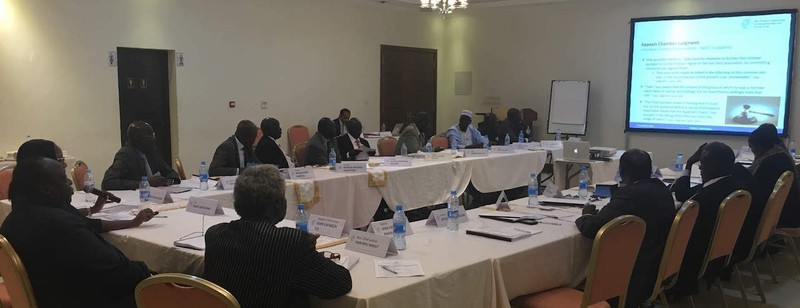Final Workshop with Supreme Court and Courts of Appeal of South Sudan
04 – 06 December 2018 – The Max Planck Foundation, in collaboration with the South Sudan Judiciary, organised a three-day workshop on ‘International and Domestic Prosecution of International Crimes’ with the objective of broadening the legal knowledge and technical skills of the South Sudanese Judiciary in international criminal law and procedure. The workshop was officially opened by the Deputy Chief Justice of South Sudan, Hon. John Gatwech Lul, who thanked the German Federal Foreign Ministry for its continued support for the Judiciary. The Ambassador of the Federal Republic of Germany to South Sudan, His Excellency, Jan Hendrik van Thiel, noted the aim of the workshop series is to enhance the knowledge of the members of the South Sudan Judiciary in order to dispense justice. The Head of Sub-Saharan Africa Projects at the Max Planck Foundation, Dr Kathrin Maria Scherr, also warmly welcomed all participants to the workshop.
The workshop’s opening ceremony also saw the hand-over of an endowment of legal material, selected with the financial assistance of the German Federal Foreign Office, to the legal library of the South Sudan Judiciary.
The primary audience of the workshop were the Justices of the Supreme Court and Courts of Appeal of South Sudan. Additionally, upon invitation by the Judiciary, a number of Judges from the High Courts of South Sudan were in attendance. The workshop focused on examining landmark cases in international criminal law, from a diverse array of courts and tribunals. Sessions consequently examined selected legal issues from decisions of the International Military Tribunal, the International Criminal Tribunal for the Former Yugoslavia, the International Criminal Tribunal for Rwanda, the Extraordinary African Chambers, the Special Court for Sierra Leone, the Bosnian War Crimes Chamber and the International Criminal Court. The final day also included a review session intended to contextualise – and summarise – the aforementioned legal precedents within the larger backdrop of international criminal law and procedure. The third day concluded with a case-study discussion intended to provide the participants with a hypothetical exercise in which to apply the legal principles and judicial rationales covered in this workshop.
This workshop, funded by the German Federal Foreign Office, concluded the implementation of the project “Supporting Transitional Justice Capacities in South Sudan”.

